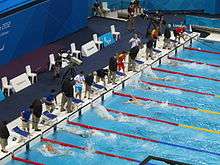S11 (classification)

S11, SB11, SM11 are disability swimming classifications for blind swimmers.
Sport
This classification is for swimming.[1] In the classification title, S represents Freestyle, Backstroke and Butterfly strokes. SB means breaststroke. SM means individual medley.[1] Jane Buckley, writing for the Sporting Wheelies, describes the swimmers in this classification as having: "unable to see at all and are considered totally blind (see IBSA B1 – appendix). Swimmers must wear blackened goggles if they swim in this class. They will also require someone to tap them when they are approaching a wall."[1]
Getting classified
Internationally, the classification is done by the International Blind Sports Association.[2] In Australia, to be classified in this category, athletes contact the Australian Paralympic Committee or their state swimming governing body.[3] In the United States, classification is handled by the United States Paralympic Committee on a national level. The classification test has three components: "a bench test, a water test, observation during competition."[4] American swimmers are assessed by four people: a medical classified, two general classified and a technical classifier.[4]
At the Paralympic Games
For the 2016 Summer Paralympics in Rio, the International Paralympic Committee had a zero classification at the Games policy. This policy was put into place in 2014, with the goal of avoiding last minute changes in classes that would negatively impact athlete training preparations. All competitors needed to be internationally classified with their classification status confirmed prior to the Games, with exceptions to this policy being dealt with on a case by case basis.[5]
Competitions
For this classification, organisers of the Paralympic Games have the option of including the following events on the Paralympic programme: 50m, 100m and 400m Freestyle, 100m Backstroke, 100m Breaststroke, 100m Butterfly, 200m Individual Medley, and 4x100m Freestyle Relay and 4x100m Medley Relay.[6]
Records
As of February 2013, in the S11 50 m Freestyle Long Course, the men's world record is held by Yang Bozan and the women's world record is held by Cecilia Camellini.[7] In the S11 400 m Freestyle Long Course, the men's world record is held by the American John Morgan and the women's world record is held by German Daniela Schulte.[8]
Competitors
Swimmers who have competed in this classification include Alexander Chekurov,[9] Enhamed Enhamed[9] and Junichi Kawai[9] who all won medals in their class at the 2008 Paralympics.[9]
American swimmers who have been classified by the United States Paralympic Committee as being in this class include Katie Pavlacka, Rio Popper, Julianna Raiche and Rylie Robinson.[10]
See also
References
- 1 2 3 Buckley, Jane (2011). "Understanding Classification: A Guide to the Classification Systems used in Paralympic Sports". Retrieved 12 November 2011.
- ↑ "IBSA Medical Classification". International Blind Sports Association. Retrieved 3 October 2012.
- ↑ "Classification Information Sheet" (PDF). Australian Paralympic Committee. 8 March 2011. p. 3. Retrieved 17 November 2011.
- 1 2 "U.S. Paralympics National Classification Policies & Procedures SWIMMING". United States Paralympic Committee. 26 June 2011. Retrieved 18 November 2011.
- ↑ "Rio 2016 Classification Guide" (PDF). International Paralympic Committee. International Paralympic Committee. March 2016. Retrieved July 22, 2016.
- ↑ "Swimming Classification". The Beijing Organizing Committee for the Games of the XXIX Olympiad. 2008. Retrieved 18 November 2011.
- ↑ "IPC Swimming World Records Long Course" (PDF). International Paralympic Committee. Retrieved 10 February 2013.
- ↑ "IPC Swimming World Records Long Course" (PDF). International Paralympic Committee. Retrieved 10 February 2013.
- 1 2 3 4 "Results". International Paralympic Committee. Retrieved 18 November 2011.
- ↑ "USA NATIONAL CLASSIFICATION DATABASE" (PDF). United States Paralympic Committee. 7 October 2011. Retrieved 18 November 2011.